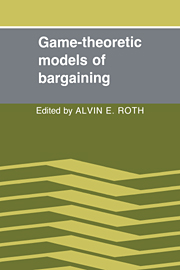Book contents
- Frontmatter
- Contents
- List of contributors
- Preface
- Chapter 1 Editor's introduction and overview
- Chapter 2 Disagreement in bargaining: Models with incomplete information
- Chapter 3 Reputations in games and markets
- Chapter 4 An approach to some noncooperative game situations with special attention to bargaining
- Chapter 5 Infinite-horizon models of bargaining with one-sided incomplete information
- Chapter 6 Choice of conjectures in a bargaining game with incomplete information
- Chapter 7 Analysis of two bargaining problems with incomplete information
- Chapter 8 Sequential bargaining mechanisms
- Chapter 9 The role of risk aversion in a simple bargaining model
- Chapter 10 Risk sensitivity and related properties for bargaining solutions
- Chapter 11 Axiomatic theory of bargaining with a variable population: A survey of recent results
- Chapter 12 Toward a focal-point theory of bargaining
- Chapter 13 Bargaining and coalitions
- Chapter 14 Axiomatic approaches to coalitional bargaining
- Chapter 15 A comment on the Coase theorem
- Chapter 16 Disclosure of evidence and resolution of disputes: Who should bear the burden of proof?
- Chapter 17 The role of arbitration and the theory of incentives
Chapter 8 - Sequential bargaining mechanisms
Published online by Cambridge University Press: 23 September 2009
- Frontmatter
- Contents
- List of contributors
- Preface
- Chapter 1 Editor's introduction and overview
- Chapter 2 Disagreement in bargaining: Models with incomplete information
- Chapter 3 Reputations in games and markets
- Chapter 4 An approach to some noncooperative game situations with special attention to bargaining
- Chapter 5 Infinite-horizon models of bargaining with one-sided incomplete information
- Chapter 6 Choice of conjectures in a bargaining game with incomplete information
- Chapter 7 Analysis of two bargaining problems with incomplete information
- Chapter 8 Sequential bargaining mechanisms
- Chapter 9 The role of risk aversion in a simple bargaining model
- Chapter 10 Risk sensitivity and related properties for bargaining solutions
- Chapter 11 Axiomatic theory of bargaining with a variable population: A survey of recent results
- Chapter 12 Toward a focal-point theory of bargaining
- Chapter 13 Bargaining and coalitions
- Chapter 14 Axiomatic approaches to coalitional bargaining
- Chapter 15 A comment on the Coase theorem
- Chapter 16 Disclosure of evidence and resolution of disputes: Who should bear the burden of proof?
- Chapter 17 The role of arbitration and the theory of incentives
Summary
Introduction
A fundamental problem in economics is determining how agreements are reached in situations where the parties have some market power. Of particular interest are questions of efficiency and distribution:
How efficient is the agreement?
How can efficiency be improved?
How are the gains from agreement divided among the parties?
Here, I explore these questions in the context of bilateral monopoly, in which a buyer and a seller are bargaining over the price of an object.
Two features of my analysis, which are important in any bargaining setting, are information and impatience. The bargainers typically have private information about their preferences and will suffer some delay costs if agreement is postponed. Information asymmetries between bargainers will often lead to inefficiencies: The bargainers will be forced to delay agreement in order to communicate their preferences. Impatience will tend to encourage an early agreement and will make the parties' communication meaningful. Bargainers with high delay costs will accept inferior terms of trade in order to conclude agreement early, whereas patient bargainers will choose to wait for more appealing terms of trade.
Some authors have examined the bargaining problem in a static context, focusing solely on the role of incomplete information and ignoring the sequential aspects of bargaining. Myerson and Satterthwaite (1983) analyze bargaining as a direct revelation game.
- Type
- Chapter
- Information
- Game-Theoretic Models of Bargaining , pp. 149 - 180Publisher: Cambridge University PressPrint publication year: 1985
- 8
- Cited by



